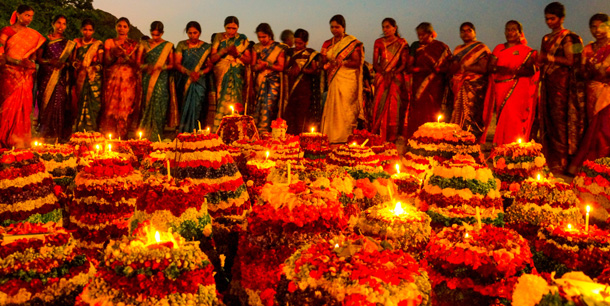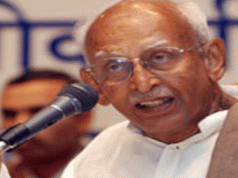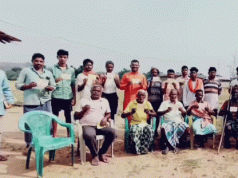
Bathukamma, or the flower festival of Telangana is celebrated by the women folk of Telangana. Every year, the ritual is practised as per the Telugu version of the Hindu calendar and during the months of September/October.
The festival starts on the day of Mahalaya Amavasya, according to the Hindu calendar and cumulates two days before Dussehra, marking the onset of autumn. One popular story about the origin of the festival suggests that there once lived a king from the Chola dynasty named Dharmanganda. After 100’s of his sons died in warfare, a daughter is born with blessing of Goddess Lakshmi, named as Bathukamma, composed of two Telugu workds “Bathuku”(life) and “amma”(mother) meaning “long live girl” / “girl of life”. It is believed that the girl had the blessings of Goddess Gouri, and since then the rituals are practised in her honour, praying for healthier, wealthier and a happy long life. During Bathukamma married women usually come back to their homes from their in- laws’ and breathe the fresh air of their childhood, and along with other girls from the family and their locality celebrate it with wild flowers of vibrant colours.
The celebration is marked by making two flower stacks, a bigger and a smaller stack from each household with an inherent sense of the tradition being passed to the younger generation, which has to go on and on. Kids and elders participate with same rigor and enthusiasm. It is a festival of nine days during which women clean their houses, make small stacks of flowers set around a cylindrical mould of cow muck and place them on wide plates called Thambalam, bring out their Flower stacks or Bathukammas, place them together, make circles around them and perform folk dances. It is a beautiful festival filled with energetic music, folk dance and bright coloured flowers. The dance is usually performed after nightfall when women wear traditional clothes, jewellery and make food offerings to their Bathukammas. The songs are weaved across the life events and celebrations, with catch words like chandamama, Uyyalo, Kole Kole, Gouramma, Ennelo etc added after each line of the life song.
The nine days, multiple forms of Bathukammas are revered with different naivedyams (Offering to god). The sequence of the names is “Engili Bathukamma with offering of Sesame and Jaggery; Atukula Bathukamma with offering lentils, jaggery and Rice Flakes, Muddapappu Bathukamma with offering plain dal and Jaggery, fourth day , nanabiyyam , followed by Atlabathukamma, Alakala Bathukamma, Arremi Bathukamma, Vepakayala bathukamma, Vennamuddala bathukamma and the final day is of Saddula Bathukamma.
Saddula Bathukamma is celebrated a two of days before Dussera. All the family members stay at home, flowers are adorned as a big Bathukamma with new clothes, prayers and festivities. The festive feast comprises of Saddulu made with multi-grain flour, jaggery and lots of ghee. Bathukammas are carefully taken to the nearest lake for Holy Immersion, accompanied by rhythmic drumbeats and enthusiastic folk songs echoing the streets. After they reach the water body, they immerse their stacks in the water. This process of preparation and sharing food is symbolizes the minimalism and extreme respect for each other. The married women of the family get to their maiden home, gifted and blessed for maternal family support.
Bathukamma is a festival symbolising the relationship between earth, water and living beings. The flowers which are used in the preparation of the Bathukammas, enrich the growth of aquatic plant life. Besides, these flowers also play an critical role in cleansing and refreshing the water bodies, reducing contamination, reinforcing lakes and ponds to retain more water. In times when the natural fresh water is dwindling and endangered, the people from Telangana have their own way of preserving it. It is indeed something that the people of Telangana take pride in. They inherently know the process of saving water from contamination, and yet make it enjoyable.
This celebration is beyond caste and creed. People get together as groups and celebrate. ‘Saddulu’ are exchanged after the celebration. The food being consumed across the days, is of high nutritional value and builds up good resistance to fight the cold winters. This festival appreciates the beauty of nature, the collective spirit of people, the enthusiasm of women, and the scientific approach towards preserving natural resources. Hence the festival remains an icon of Telangana’s diverse culture and hence tagged as the “State Festival of Telangana”, Our Pride.
-Sindhoora Samyuktha














